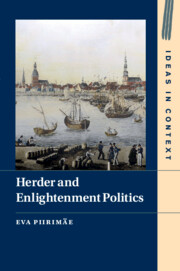30 results
1 - The Discovery of the Past
- from Part I - Romantic Genealogies (1750–1790)
-
-
- Book:
- The Cambridge History of European Romantic Literature
- Published online:
- 10 January 2024
- Print publication:
- 09 November 2023, pp 41-72
-
- Chapter
- Export citation
8 - Citizens of the World
- from Part II - Revolution to Restoration (1790–1815)
-
-
- Book:
- The Cambridge History of European Romantic Literature
- Published online:
- 10 January 2024
- Print publication:
- 09 November 2023, pp 255-283
-
- Chapter
- Export citation
6 - The Crisis of Enlightenment
- from Part I - Romantic Genealogies (1750–1790)
-
-
- Book:
- The Cambridge History of European Romantic Literature
- Published online:
- 10 January 2024
- Print publication:
- 09 November 2023, pp 188-220
-
- Chapter
- Export citation
3 - The Romantic Sublime
- from Part I - Romantic Genealogies (1750–1790)
-
-
- Book:
- The Cambridge History of European Romantic Literature
- Published online:
- 10 January 2024
- Print publication:
- 09 November 2023, pp 105-134
-
- Chapter
- Export citation
8 - The Expressive Curriculum
-
- Book:
- Educating for Democracy
- Published online:
- 20 April 2023
- Print publication:
- 27 April 2023, pp 119-139
-
- Chapter
- Export citation
Chapter 2 - Rousseau and the Origins of the ‘Current Malaise of the World’
-
- Book:
- Herder and Enlightenment Politics
- Published online:
- 30 March 2023
- Print publication:
- 06 April 2023, pp 63-96
-
- Chapter
- Export citation
Chapter 5 - German Freedom and Modern Liberty
-
- Book:
- Herder and Enlightenment Politics
- Published online:
- 30 March 2023
- Print publication:
- 06 April 2023, pp 173-203
-
- Chapter
- Export citation
Chapter 1 - Republics, Monarchies and the Philosophy of Human Society
-
- Book:
- Herder and Enlightenment Politics
- Published online:
- 30 March 2023
- Print publication:
- 06 April 2023, pp 31-62
-
- Chapter
- Export citation
Chapter 3 - Montesquieu’s System and Reforms in Russia
-
- Book:
- Herder and Enlightenment Politics
- Published online:
- 30 March 2023
- Print publication:
- 06 April 2023, pp 97-131
-
- Chapter
- Export citation
Chapter 4 - The Bildung of Humanity and Modern Virtue
-
- Book:
- Herder and Enlightenment Politics
- Published online:
- 30 March 2023
- Print publication:
- 06 April 2023, pp 132-172
-
- Chapter
- Export citation
Chapter 6 - The Vocation of Poets, Pastors and Philosophers
-
- Book:
- Herder and Enlightenment Politics
- Published online:
- 30 March 2023
- Print publication:
- 06 April 2023, pp 204-229
-
- Chapter
- Export citation
Chapter 7 - State-Machines, Commerce and the Progress of Humanität in Europe
-
- Book:
- Herder and Enlightenment Politics
- Published online:
- 30 March 2023
- Print publication:
- 06 April 2023, pp 230-275
-
- Chapter
- Export citation
Conclusion
-
- Book:
- Herder and Enlightenment Politics
- Published online:
- 30 March 2023
- Print publication:
- 06 April 2023, pp 324-333
-
- Chapter
- Export citation
Epilogue
-
- Book:
- Herder and Enlightenment Politics
- Published online:
- 30 March 2023
- Print publication:
- 06 April 2023, pp 334-345
-
- Chapter
- Export citation
Introduction
-
- Book:
- Herder and Enlightenment Politics
- Published online:
- 30 March 2023
- Print publication:
- 06 April 2023, pp 1-30
-
- Chapter
- Export citation
Chapter 8 - Perpetual Peace and Purified Patriotism
-
- Book:
- Herder and Enlightenment Politics
- Published online:
- 30 March 2023
- Print publication:
- 06 April 2023, pp 276-323
-
- Chapter
- Export citation

Herder and Enlightenment Politics
-
- Published online:
- 30 March 2023
- Print publication:
- 06 April 2023
4 - Genius, Thick and Thin
- from Part II - Genius and the Fine Arts
-
- Book:
- The Origins of Kant's Aesthetics
- Published online:
- 10 January 2024
- Print publication:
- 26 January 2023, pp 103-128
-
- Chapter
- Export citation
11 - Herders and Drought in the Sahel of Burkina Faso: Traditional Knowledge and Resilience
- from Part II - Indigenous Perspectives on Environmental Change
-
-
- Book:
- Resilience through Knowledge Co-Production
- Published online:
- 02 June 2022
- Print publication:
- 30 June 2022, pp 195-202
-
- Chapter
- Export citation
5 - Romanticism, the Folk, and Musical Nationalisms
- from Part II - Worlds
-
-
- Book:
- The Cambridge Companion to Music and Romanticism
- Published online:
- 06 August 2021
- Print publication:
- 26 August 2021, pp 74-91
-
- Chapter
- Export citation

